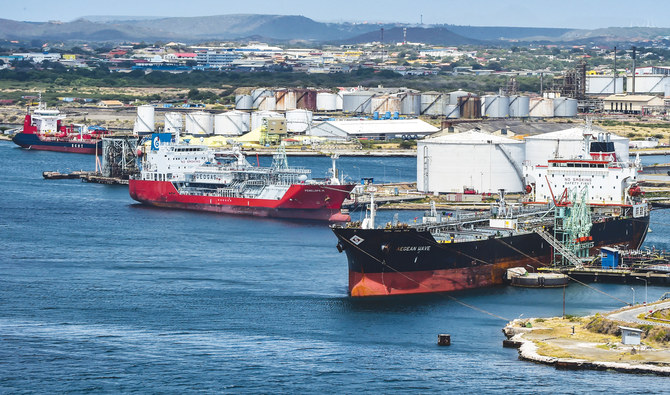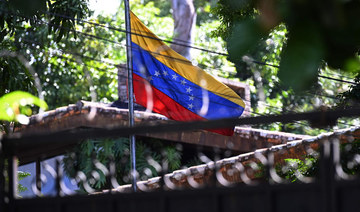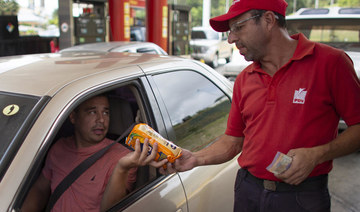MIAMI: In May, after pulling out of a Chinese shipyard for repairs, a giant oil tanker set out on a perilous journey.
Dialing in “Caribbean” on a mandatory tracking system, the captain of the Liberia-flagged vessel headed west. Then, weeks later, as it neared Venezuelan waters, the VL Nichioh suddenly stopped transmitting its location, course and speed in violation of international maritime rules, essentially vanishing on the high seas without a trace.
What happened while the ship was offline remains a mystery. But when it resurfaced nine days later while steaming toward Asia, the Nichioh was riding low in the water — a sure sign to ship-tracking experts that it had turned off its transponder to cloak a valuable cargo targeted by US sanctions: Venezuelan crude oil.
As the Trump administration has clamped down on President Nicolas Maduro with sanctions set on depriving him of easy cash from Venezuela’s vast oil reserves, some ship captains and their employers are eager to help the embattled socialist by “going dark” to hide tankers brimming with crude.
But industry experts say this evasive behavior, perfected by what the US considers rogue ships transporting oil for Iran in violation of US sanctions, comes at a great risk.
“These ships are carrying
2 million barrels of crude oil,” said Russ Dallen, the Miami-based head of Caracas Capital Markets brokerage, who tracks maritime activity near Venezuela to identify sanctions-busting activity. “They can’t be blindly wandering around in the dark. It’s an environmental disaster waiting to happen.”
Under a United Nations maritime treaty, ships of over 300 tons have been required since 2004 to use what is known as an automated identification system to avoid collisions and assist rescues in the event of a spill or accident at sea.
While ship captains have the discretion to turn off the transponders as they traverse flashpoints like the Strait of Hormuz, or to evade pirates off the coast of Somalia, ship-monitoring companies have become adept at tracking a vessel’s movements and draft to help law enforcement monitor for sanctions violations and criminal behavior.
Until recently, tankers docking in Venezuela had little reason to switch off their transponders — a tactic more associated with illegal Chinese fishermen off the Pacific coast of South America or human traffickers in the eastern Mediterranean.
But in January, after Maduro was sworn in for a second term many nations considered illegitimate, the Trump administration barred US companies from dealing with the Venezuelan state-run oil giant PDVSA and threatened retaliation against foreign companies that continue to do business with it.
As part of that offensive, PDVSA’s entire fleet of 34 vessels was frozen, essentially barred from ports in the US and other Western nations, as well as a several private fleets caught delivering oil to Maduro’s ally Cuba. The move has accelerated a collapse in Venezuela’s crude production to its lowest level in seven decades despite sitting atop the world’s largest crude reserves.
“Once blacklisted, these vessels become lepers and are very hard to operate,” said Omer Primor, head of marketing at Windward, a maritime analytics firm that assists law enforcement in hunting down potential sanctions violators. “Nobody will deal with them, so they essentially become floating storage devices.”
In the nine months since sanctions were imposed, there have been 14 suspicious dark activities spotted near Venezuelan waters, according to Windward. That is about 22 percent of the 50 reported port calls to Venezuela during the same period, a sharp decline in above-board maritime traffic in the nine months prior to sanctions.
Windward said that most of the cloaked crude is going to China or Russia — Maduro’s two biggest financial backers, for whom US sanctions are less of a deterrent — as well as India.
There are other tricks companies use to duck detection, such as reporting a false destination, frequently changing management or carrying out high-risk ship-to-ship transfers in which “dark” vessels come together on the high seas to hand over their cargo. Officials in Brazil initially suspected a dark ship loaded with Venezuelan crude of being behind a mysterious spill last month that has hit 2,100 km of coastline.
In the case of the Nichioh, it unloaded cargo in early September in the Indian port of Sikka, where Reliance Industries runs the world’s largest refinery. It then sailed through the Suez Canal and Strait of Gibraltar, reporting as its destination “Carribs for Order.”
But after docking for a few days in Trinidad, the Nichioh switched to “Aruba” and went dark for 10 days, once again picking up Venezuelan crude, according to ship-tracking firm Kpler. As of Nov. 12, the ship was heading past South Africa en route to China.
According to Kpler the two voyages by the Nichioh were chartered by Russia’s state-controlled Rosneft, which itself has been sanctioned by the US for the crisis with Ukraine. Prior to US sanctions, the ship had never reported sailing in the Western Hemisphere.
The ship’s registered owner, a Liberia-based company named Major Shipping SA, could not be located for comment. Liberia is one of the world’s most popular flag states because owners can register ships with few restrictions and little more than an email address. Most of the dark activities spotted by Windward off Venezuela involved Liberia-registered ships.
But it’s not just aging hulks at the fringes of the maritime industry cashing in on Venezuela’s desperation.
In June, Cosrising Lake, owned by an affiliate of China’s shipping giant Cosco, went silent for 14 days after loading 1.9 million barrels of crude in the Venezuelan port of Jose, according to Kpler. A few weeks later, it unloaded its cargo in the Chinese port of Dongjiakou.
Cosco didn’t say why the Hong Kong-flagged ship went silent. But in a statement, it said that it operates in compliance with laws and regulations and that its ships have maintained normal operations of their AIS systems in accordance with the international convention for the safety of life at sea.
The Trump administration is also looking into reports that Hurd’s Bank off the coast of Malta is becoming a staging ground for ship-to-ship transfers to hide Russia’s supplying of chemicals that Venezuela’s industry desperately needs to dilute its heavy crude, a senior US official said. He spoke on the condition of anonymity because he wasn’t authorized to discuss the matter publicly. Previously Venezuela imported diluents from the US
“Criminals connected to Venezuela are getting increasingly creative as they manipulate the laws that govern international maritime commerce to bypass sanctions,” said Ian Ralby, head of I.R. Consilium, a US-based consultancy.
“Authorities in the region and beyond need to be both alert and proactive in preventing the Maduro regime from using illicit activity to convert Venezuelan resources into cash.”
























